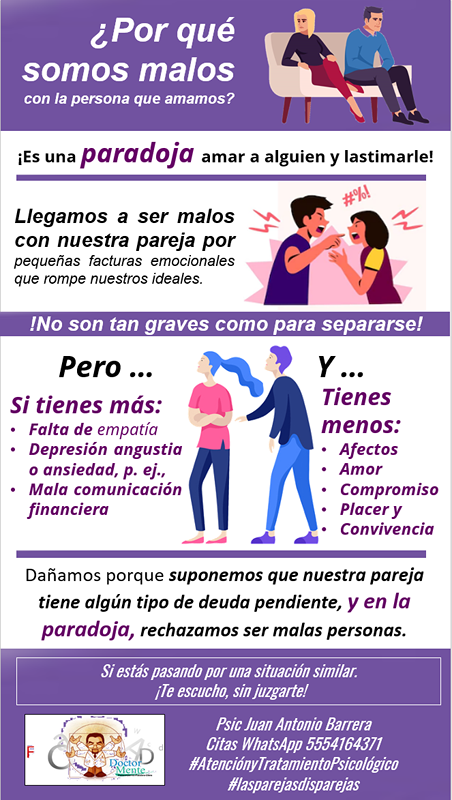Why do we behave badly with the person we love?

- 1723
- 282
- Glen Vandervort Sr.
Nor the absence of love implies hate, nor the absence of hate guarantees love. Brigitte Vasallo
For the eye of the common observer, it could be surprising in the issue of relationships, think that someone: who would give everything for love, who looked into our eyes, whispered in our ear and sworn that he would be eternally with us with us , could hurt us deliberately. This implies A contradiction.
Well, the conscious analysis of the paradoxes of life could place it at the time of Leonardo da Vinci. In the wonderful book by Michael Gelb, entitled Great intelligence, He describes the way the Renaissance genius thought, summarizing his intellect to seven Leonardin principles, among which the “sfumato stands out, literally means: to become smoke. It is the willingness to accept ambiguity, paradox and uncertainty ”. (Gelb, 1999, p. 156). A way to analyze with a scientific format, the paradoxical thought From the point of view of social psychology it is presented in the figure of Leon Festinger. His theory of cognitive dissonance "proposed that, although we can seem logical in general in our thinking and behavior, we often deal with irrational and maladaptive behavior to maintain cognitive consistency" (Franzoi, 2007, p. 195). For non -specialists, don't worry, I explain this later in simpler words.
In an act of mental economy, We tend to simplify the environment in opposites: day and night; love and hate; cold and hot. And all this seems unquestionable to us, it simply seems natural to us and we take it for granted. Consciously, it is difficult to imagine to love a person to the soul and at the same time make him an evil.
A paradoxical behavior in the false "love", we can observe it in Stockholm syndrome. A person falls in love with his captor; The person who hurts him, but that is not the case of behaviors to be analyzed now.
In the Leonardinos principles, the sfumato, is a skill that supports the tension of the opposites and with it accepts: uncertainty, ambiguity and paradox. In a clear example of this, the Italian genius analyzed: beauty and ugliness.
At the outset, then we might think somewhat impossible for intense love for being loved, leads us instead of protecting him to violate him. Where the reason for our motivations and poetry gatille violence.
Well, there are several detonators that lead us to it: metaphorically When the heart feels irritated, we are not the best version of ourselves. Nor are we the most affable person, when we criticize and despise the couple.
Content
Toggle- What wears love and leads us to attenuated violence with respect to the person we love?
- The evidence found in investigations
- The presence of a physical or mental disorder
- When money is scarce, love becomes abuse?
- Final reflection
- References
What wears love and leads us to attenuated violence with respect to the person we love?
Loving is not looking at each other, but rather to look at both in the same direction. Antoine de Saint-Exupéry
There are several factors present: the lack of empathy in certain moments of coexistence, the lack of money, have some physical illness, be prey to the stress of everyday life, have a bad mood, suffer some emotional disorder (P. eg., anguish, anxiety, depression), have poor financial communication, feel that the couple broke with the expectations of mutual commitment, small unresolved pending emotional invoices, well, well, that's what this article is about. They are not so serious to promote a separation, but yes, to show a certain degree of attenuated violence, but unconsciously open against the loved one. Shows your condition of being Odd Couple.

The evidence found in investigations
What is done for love, is beyond good and evil. Friedrich Nietzsche
There is evidence that shows us the reasons why we hurt the people we love. An uncontrollable fury is not discharged as in the episodes of celotipia. However, what justifies this type of actions in couples who receive mistreat There are no longer positive events that generate pleasure and novelty, show an increasingly reduced commitment in the relationship, feel a real or symbolic threat of exclusion in the Diada, as Miller (1997) demonstrated.
An interesting fact of this paradox is presented in two ways, by the couple who mistreats: if there are people external to the couple, it gives more attention to them, or positive attention can be shown in the presence of relatives or strangers, only when those those Third parties are present.
 Reconstituted families: a loss and a new beginning
Reconstituted families: a loss and a new beginning The presence of a physical or mental disorder
The fact of being honest, It is what makes relationships last. Lauryn Hill
Another different condition in the abuse of the person we love, occurs when the abuser experiences some type of physical or mental disorder. For example, in the case of experiencing as a symptom anguish by not feeling good, an unconscious reaction is to download negatively with the couple. It's important to put attention on Anguish is a common symptom in anxiety and depression. On the other hand, when a sick person feels pain or feels incapacitated to be independent and use by herself, it is common in wear, abuse to the couple.
The reaction of anguished couples and the reaction of violence attenuated with the couple was studied by Birchler and their collaborators (1975), who found what: they experience less pleasures and more dislikes, and are involved in less positive aspects in informal conversations and the Problem resolution. Most likely this same condition of Attenuated abuse It also presents with other emotional disorders and even when large doses of stress are experienced such as: to be unemployed, economic problems or diverse tensions of everyday life.
When money is scarce, love becomes abuse?
The magic of the first love It is the ignorance that you can have an end. Benjamin Disraeli
Attenuated abuse for economic reasons, most likely confirms the saying that: "When money is scarce, love goes out the window". There are scientific evidence in this regard to financial communication and its importance of speaking this complex issue: “Constructive messages about financial conflicts were positively associated with financial harmony, conjugal satisfaction and satisfaction with financial communication. Destructive financial conflict messages were negatively associated with financial harmony, marital satisfaction and financial communication satisfaction ”. (Shebib & Cupach, 2018). In simple words, We need to talk about financial issues positively, to seek solutions and not create abuse, dissatisfactions and conflicts.
We assume that the person we hurt, for the love we have given us and the micro fracture of expectations and dreams, "will be there unconditionally" and therefore We feel the confidence to carry out this attenuated violence. However, if the relationship reaches a turning point and non -return, later the positive actions, which are carried out to rescue the relationship, will be insufficient to return to the magical point of the beginning of the relationship. If we stretch the league of more, maybe and we will not have the way of repairing the damage.

A fact that attracts attention at least in the field of the office is that The couple that hurts, even when he knows he has hurt his partner, It does not experience cognitive guilt or dissonance, because in its self -perception, it is still considered "good person".
Let's analyze two questions: why don't people feel guilty when they should do it? When does anyone realize, that he has hurt the person who cares, why he does not feel guilty? The social psychologist, León Festinger, offered an answer to this, in his theory of cognitive dissonance: "Human beings are predisposed to confirm the information that confirms their beliefs and ignore and minimize, the information that refutes what you believe". (Aguilar, 2012). In simple words: We hurt our partner even though we love her, because we assume that she has some type of debt that she owes us, and refuses to be bad people despite this.
Final reflection
There are many factors that undermine the balance in the relationship. Identify them, allows learning to detect “blind points”, which in case of not being treated will lead, to gradual wear and with risk of breakdown.
Initial love is not enough, knowledge and strategy are also required. In the tour of the couple's cycle, it is normal that there are obstacles, some present before it is formed, such as the learning that comes from the family of origin, but others are presented on the road.
The small emotional invoices pending to fix, lead us to episodes of attenuated violence and go imperceptible in everyday life.
However, if they do not identify, they will continue to grow against the stability and permanence of the Diada.
Having a positive attitude will give us the possibility of activating the prefrontal cortex versus the emotional kidnapping of the cerebral tonsil. That is, we need to be more: empathic, more supportive, more compassionate, more collaborative, and all these behaviors come from the prefrontal cortex, it is what makes us human. AND, We need to regulate the emotions that predispose us to attenuated violence, that come from the cerebral tonsil.

The emotional brain: kidnappings and emotional bursts
Have a training of emotional intelligence, will allow us to handle our emotions in a healthier way and enjoy the relationship more as a couple. We need to be aware that the relationship is not a straight going, there are advances and setbacks, in addition to paradoxes which is perfectly natural.
If you don't know, how to do it, consult your trusted therapist!
References
- Aguilar, k. (2012). Carol Anne Tavris Cognitive dissonance (The City of Ideas 2009, Excerpt). [On-line]. https: // www.Youtube.com/watch?v = 4qcbjrgfiww & t = 36s
- Birchler, GR, Weiss, RL and Vincent, JP (1975). Multimétodo analysis of the exchange of social reinforcement among couples of spouses and strangers in marital and not afflicted troubles. [On-line].
- Franzoi, s. (2007). Social psychology. McGraw Hill.
- Gelb, m. J. (1999). Great intelligence (7 key principles to develop intelligence, inspired by the life and work of Leonardo da Vinci). Norma Editorial.
- Miller, RS (1997). We always hurt those we love: aversive interactions in nearby relationships. [On-line]. https: // psycnet.APA.Org/Record/1997-09191-001
- Shebib, s. & Cupach, W. (2018). Messages of financial conflict and marital satisfaction: the mediating role of financial communication satisfaction. [On-line]. https: // www.SCIRP.Org/(S (I43dyn45Texjx455qLT3D2Q))/ReferencesPapers.ASPX?REFERENCEID = 2204113
- Image: Photo by Anna Shvets in Pexels
- Image: photo of Budgeron Bach in Pexels
- « Erotic love or love company What is safer and more reliable for life as a couple?
- The law of Fraisse and the subjective conception of time »

